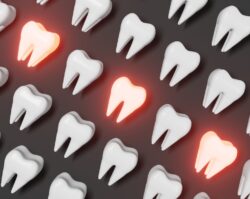
Dental emergencies have a way of happening at the worst possible time—right before a big event, late at night, or on a weekend. Whether it’s a throbbing toothache, a knocked-out tooth, or a sudden break, knowing what to do in the moment can help ease pain and protect your smile.
Here are answers to some of the most common emergency dental questions so you can be prepared if the unexpected happens.
Is My Dental Issue an Emergency or Can It Wait?
Not every dental problem requires immediate care, but some definitely shouldn’t be ignored. You should call your dentist ASAP if you experience:
- Severe, persistent tooth pain—a sign of infection or damage
- A knocked-out tooth—time is critical to saving it
- A cracked or broken tooth that’s painful or exposing the inner layers
- Facial swelling or an abscess—a possible sign of infection
- Uncontrolled bleeding from the mouth
Mild sensitivity, a small chip, or a lost filling may not need same-day treatment, but it’s still best to call your dentist to discuss next steps.
What Should I Do If I Knock Out a Tooth?
If a permanent tooth is knocked out, you have about 30-60 minutes to save it.
- Pick it up by the crown (top), not the root.
- Gently rinse with water if it’s dirty, but don’t scrub.
- Try to put it back in the socket if possible. If that’s too painful, place it in milk or saliva to keep it moist.
- Call your dentist immediately and head to the office.
If a baby tooth is knocked out, don’t try to put it back in—just call your pediatric dentist for guidance.
What If My Tooth Suddenly Starts Hurting?
A toothache can come out of nowhere, and the cause can range from a cavity to an infection or even sinus pressure. Try these quick steps to manage the pain:
- Rinse with warm salt water to soothe irritation.
- Gently floss to remove any trapped food.
- Use a cold compress on your cheek if there’s swelling.
- Take over-the-counter pain relievers if needed (but don’t put aspirin directly on the tooth!).
If the pain is sharp, throbbing, or won’t go away, call your dentist. Tooth pain is a red flag that something needs attention.
Can I Fix a Chipped or Broken Tooth at Home?
If you chip or break a tooth, don’t panic—but do act quickly.
- Save any broken pieces if possible.
- Rinse your mouth with warm water to keep the area clean.
- If the tooth has sharp edges, cover them with sugar-free gum or dental wax to avoid cutting your tongue or cheek.
- Stick to soft foods and avoid chewing on that side until your dentist can repair it.
A minor chip might not need urgent care, but a deep crack or break exposing the tooth’s inner layers does.
What Should I Do If My Crown or Filling Falls Out?
If a filling or crown comes loose, your tooth may feel sensitive to hot or cold. While waiting to see your dentist:
- Avoid chewing on that side of your mouth.
- Keep the tooth clean by rinsing with warm water.
- Use dental cement or toothpaste (not glue!) to temporarily hold a crown in place.
Lost fillings or crowns should be addressed sooner rather than later to prevent further damage.
Emergency Dental Care at Blue Valley Smiles in Overland Park, KS
Dental emergencies don’t wait for a convenient time, but quick action can make all the difference. At Blue Valley Smiles, Dr. Rachel Karabas, Dr. Michelle Bhaskar, and Dr. Todd O’Neil provide compassionate, expert care when you need it most.
If you’re dealing with a dental emergency, call our office right away—we’ll help you get out of pain and back to smiling in no time!
